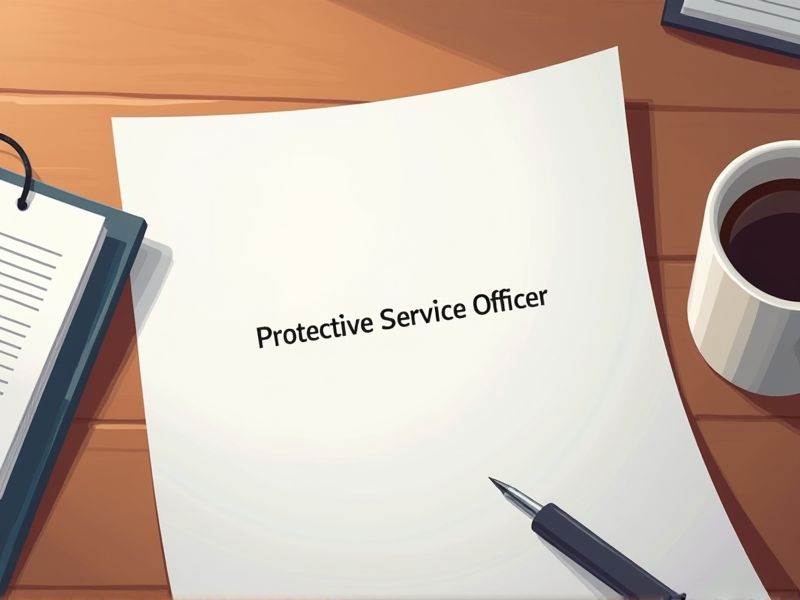
Protective Service Officers play a critical role in maintaining safety and security in a variety of settings, necessitating a foundation of specialized knowledge and skills. Certain certifications ensure officers are well-versed in emergency response, legal considerations, and effective communication strategies. These credentials enhance their ability to handle complex and potentially dangerous situations with confidence and competence. Important certifications you may need for a Protective Service Officer include the following.
Basic Life Support (BLS)/CPR Certification
Protective Service Officers often encounter high-stress, emergency situations where immediate medical intervention is crucial, making Basic Life Support (BLS)/CPR certification essential. BLS/CPR training equips officers with the skills to perform life-saving procedures, such as chest compressions and rescue breaths, effectively increasing survival rates in cardiac arrest cases. Certification also ensures officers adhere to standardized protocols, minimizing risks and improving outcomes during emergencies. Trained officers can maintain safety and public confidence, as they are prepared to respond promptly to medical emergencies.
Firearm Proficiency Certification
Firearm proficiency certification is necessary for protective service officers to ensure they have the skills required to handle weapons safely, reducing the risk of accidental discharges. Certification provides a standard measure of competency, increasing trust and credibility among employers and the public. Proficiency training helps officers make informed decisions in high-stress situations, minimizing the potential for unnecessary use of force. Regulations mandate this certification to ensure officers adhere to local, state, and federal laws regarding firearm usage and public safety.
Defensive Tactics Certification
Protective Service Officers require Defensive Tactics Certification because it enhances their ability to safely manage potentially volatile situations. This certification provides them with standardized training, which helps in reducing the likelihood of injury during confrontations. The skill set acquired through such certification is critical in de-escalating dangerous scenarios. Employers also view this certification as a validation of an officer's competence and readiness to handle high-pressure environments.
Emergency Vehicle Operations Course (EVOC) Certification
Emergency Vehicle Operations Course (EVOC) certification equips Protective Service Officers with skills essential for safely maneuvering emergency vehicles in high-stress situations. Proper training reduces the likelihood of accidents, safeguarding both the officer and the public. Certification ensures that officers adhere to standardized driving protocols, maintaining consistency in emergency response. EVOC enhances decision-making under pressure, crucial for officers tasked with protecting individuals in dynamic environments.
First Aid/CPR-AED Certification
First Aid/CPR-AED certification equips Protective Service Officers with essential life-saving skills that can increase the survival rates during medical emergencies. These officers often work in high-risk environments where immediate medical response can be crucial. Certification ensures they are prepared to manage situations such as cardiac arrest, providing timely interventions until professional medical help arrives. Employers may require certification to comply with legal or safety standards, enhancing overall safety protocols.
Incident Command System (ICS) Certification
Protective Service Officers deal with emergencies, and ICS certification provides a structured approach to handle such situations efficiently. Certification ensures officers can effectively integrate with other response teams, reducing confusion during operations. Training under ICS guidelines equips officers with essential communication skills, which are crucial during crisis coordination. Standardized procedures in ICS also prepare officers to streamline operations, improving decision-making and resource allocation.
Crisis Intervention Training (CIT) Certification
Protective Service Officers often encounter high-stress situations that require quick, effective de-escalation strategies, and Crisis Intervention Training certification provides them with these skills. Certification in CIT ensures that officers are better equipped to manage individuals experiencing mental health crises, reducing the likelihood of harm. Through CIT, officers gain expertise in identifying signs of mental distress, which facilitates appropriate and compassionate responses. This training also enhances communication skills and promotes safer interactions, leading to increased community trust and cooperation.
Emergency Medical Technician (EMT) Certification
Having EMT certification equips a Protective Service Officer with the skills to provide immediate medical assistance, which is critical in emergencies. It enhances their ability to respond effectively to medical incidents, improving overall safety. This certification also enables better coordination with medical professionals during crisis situations. Being trained in medical protocols reduces response time, potentially saving lives.
Use of Force/De-escalation Certification
Protective Service Officers often face high-pressure situations where the risk of conflict escalation is significant, necessitating proper training in de-escalation techniques. Certification in Use of Force and De-escalation ensures that officers have standardized skills to handle potentially volatile situations safely and effectively. Proper certification can reduce the likelihood of injuries, both for officers and the public, by promoting non-violent resolutions whenever possible. A documented certification process aids in maintaining public trust and accountability within security operations.
HAZMAT Awareness Training Certification
Protective Service Officers often encounter hazardous materials, requiring HAZMAT Awareness Training Certification to recognize potential dangers. Recognition of harmful substances ensures they can respond appropriately, preventing potential health risks. Certification ensures officers understand proper communication and coordination with emergency responders during incidents. Regulatory compliance mandates such training to minimize legal liabilities and ensure workplace safety.
Summary
When you, as a reader, understand the value of certifications for Protective Service Officers, you'll see increased job opportunities and higher potential earnings. Receiving tailored training enhances their skillset, improving their capacity to respond effectively in critical situations. This can lead to better community trust and enhanced security measures. Employers often prioritize hiring certified officers, recognizing their commitment to safety and professional development.
